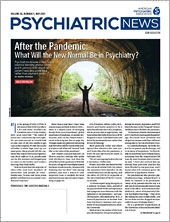As my role within APA evolved over the past three years, I started becoming familiar with the levels of engagement of different groups of psychiatrists within the organization. The greatest divide I saw was between psychiatrists in training or the early stages of their careers and those with several years of experience behind them. Evident were gaps within APA in which ideally the presence of a mentor could have lent direction and guidance to young psychiatrists’ career trajectory. Noticeable were the platforms not fully and appropriately utilized to bring forth the diversity of perspectives existing within these groups. I spent a long time reflecting on plausible reasons for this. Perhaps it was the lack of consistency in methods of communication or disillusionment stemming from a collective understanding that these ideas would not realistically translate into meaningful policy changes.
“Finding Our Voice,” a new podcast from APA Publishing and Psychiatric News, is an exciting and informative program that brings the viewpoints and opinions of the next generation of psychiatrists—including residents, fellows, and early career psychiatrists—to the forefront. I am its host and podcast planner. The theme for each year’s podcasts will align with the APA president’s agenda; thus, the inaugural seven episodes of the podcast reflect the focus of APA President Jeffrey Geller, M.D., M.P.H., on systemic racism and how discrimination impacts racial, ethnic, and other minority groups. Every episode has two guests: a resident-fellow member (RFM) or early career psychiatrist (ECP) and a subject matter expert. They pair up as mentee and mentor to discuss specific elements of structural racism while building on each other’s ideas. As I lead discussions, guests offer fresh perspectives on difficult issues by sharing their own stories and those of their patients. Narratives of real life and clinical experiences lend foundation to this massive paradigm shift that is taking place around addressing racism within APA and psychiatry in general.
At press time, four of the seven episodes have been released, centering on Hispanics, African Americans, international medical graduates, and women. These are four of the seven minority/underrepresented (M/UR) groups recognized by APA and the APA Assembly. Coming up next are episodes on the Asian American, LGBTQ, and American Indian/Alaska Native/Native Hawaiian communities.
Dr. Esperanza Diaz and Dr. Andrea Mendiola from Yale University were my guests on the first episode. During Hispanic Heritage Month, they provided insights gleaned from their work and highlighted the many challenges that their Hispanic patients and the community at large have faced on account of discrimination.
In the second episode, released during Black History Month, Dr. Rachel Talley and Dr. Sarita Metzger from the Perelman School of Medicine at the University of Pennsylvania moved the conversation further by shining light on issues related to redlining and home ownership among other social determinants of health affecting the African American community.
In anticipation of the 2021 National Resident Matching Program results (
Psychiatric News) and the worrisome trend of rapidly declining IMG numbers, Dr. Vishal Madaan from the University of Virginia and Dr. Manal Khan from the University of California, Los Angeles, discussed the physician and patient discrimination they encountered through micro- and macro-aggressions from their colleagues and other patients and the road ahead for them and for other IMGs.
The most recent episode, released at the end of Women’s History Month, brought insights from Dr. Sandra DeJong and Dr. Shireen Cama, who work at the Cambridge Health Alliance system. Offering timely information about the gender wage gap and maternal leave issues pertinent to women in academic psychiatry, they recounted their own experiences with women mentors in academia who helped them navigate complex situations at various challenging phases of their lives.
Short bios on guests and resource materials pertinent to each episode can be found
here. The podcast is available on the following major platforms: Google, Apple, Spotify, and Stitcher.
This seven-episode segment is my tribute to M/UR groups in light of recent events, and I hope it will foster many productive discussions that will in turn influence leadership within our specialty and policymakers to address social injustices and close gaps on multiple levels like wages, opportunity, and recognition of expertise among others.
Above all, “Finding Our Voice” serves as a platform for the younger generation of psychiatrists to express themselves as members of APA collaboratively working with their mentors to achieve an equitable future for our organization, the field of psychiatry, and American society. ■

